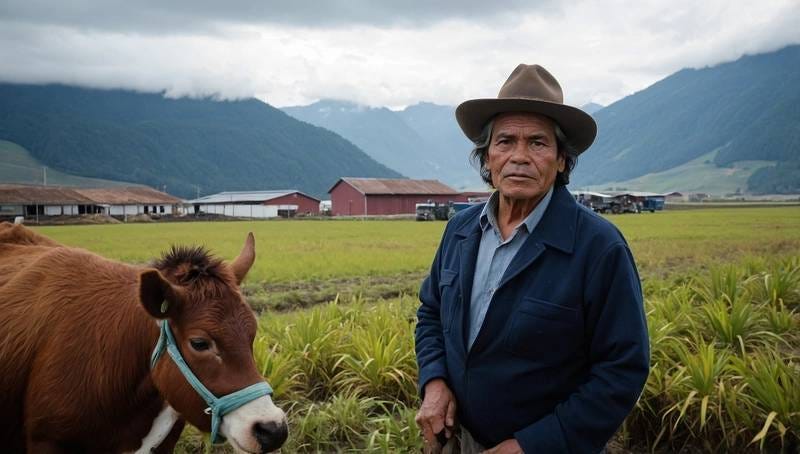Why Journalism Matters
Freedom for Belarusian journalist but will he still have a job with Radio Free Europe? Explore courageous investigative journalism with the Shining Light awards. Taking fossil fuel companies to court
5 minute read
An imprisoned Belarus journalist is freed but his job is threatened by Trump administration action against Voice of America

Andrei Kuznechyk is happy, grateful, and relieved to be free.
Kuznechyk is a journalist with the US-funded broadcaster Radio Free Europe/Radio Liberty, spent 1,175 days in a Belarusian prison and was released after several years of lobbying which culminated in a deal brokered under the Trump administration in February.
He is now safe living in Lithuania with his family.
In an interview published by the Columbia Journalism Review in May, Kuznechyk explained the impact of his imprisonment and what his new found freedom fel like.
“I am still in the euphoria of freedom, of being reunited with my family. And in amazement at how much the world has changed in just three years. This amazement, unfortunately, is not always joyful. There is almost no news about the war in Ukraine from the Belarusian official media. I learned many shocking facts a short time after my release.
“I felt immensely happy and guilty at the same time. Guilty that I missed three years of my children growing up. That my wife had to cope with everything on her own all this time. That now they had to leave their home, relatives, and homeland, and start life from scratch. That they did all this is a great vote of confidence in me and a manifestation of boundless love. I am immensely grateful to them for this.
“The journalistic habit of trusting only information that you can verify—which is impossible in prison—led me to believe almost nothing, neither propaganda nor exhausting rumours of imminent release, pardon, or amnesty that gave false hope. That is why there were no painful disappointments.”
Six years in prison
He was sentenced to six years in prison by the Belarusian government for ‘creating or participating in an extremist organisation’ simply for doing his job at RFE/RL. and press freedom groups and US official condemned his conviction as politically motivated and began a camapogn to lobby for his release.
Ironically on his release Kuznechyk learned that his employer is threatened with closure by the very government that has always defended freedom of the press around the world.
As we reported in our last issue, in February Trump moved to close down the US Agency for Global Media which oversees the work of independent editorial outlets like RFE/RL, Voice of America and Radio Free Asia which have a combined weekly audience of 427 million people. The US domestic public broadcasters NPR and PBS are also threatened.

In the interview he explained eloquently and passionately how important Radio Savboda (the Belarusian service of RFE) is to the people of Belarus and what an inestimable loss its closure would be to the forces fighting for freedom and democracy within his country.
“It still seems to me that it is a misunderstanding that RFE/RL could close down at a time when its voice is so needed.
“Radio Svaboda is more than just a source of information that is otherwise unavailable in the country. In Belarus, it has created a Belarusian cultural code; reopened hushed-up pages of history; introduced outstanding writers, musicians, and artists. It is difficult to overestimate the role of Radio Svaboda in preserving the traditions of the Belarusian language. All this is with constant professionalism and journalistic courage.
“But that is not all. Radio Svaboda has always been more than a media outlet, more than a source of content. It is listened to and read with the hope that someday, sooner rather than later, Belarus will become part of the free world.
“Radio Svaboda is a unique media outlet in the modern history and present of Belarus. Its closure would be a gift to the forces that consider objective journalism, democratic values, and uncontrolled, uninfringed Belarusian culture and language a threat to their control over society and its future. Belarusians will lose not only an uncensored media outlet, but also a symbol of hope.”
Similar impacts are being felt around the world as news operations are shutdown because of Trump’s actions.
A recent report in The Guardian highlighted the experience of a South American radio reporter,Carolina Valladares Pérez. She is a Washington-based correspondent for the Spanish language service of the US-funded international news service Voice of America. She knows about the threats and limitations of reporting from autocratic states and war zones.
Speaking to Guardian US political correspondent Lauren Gambino Pérezssaid she had been silenced ‘not by a faraway regime, but by the government of the United States.
“Nicolás Maduro did not close our bureau,” she said, of Venezuela’s authoritarian leader. “Donald Trump closed it. I find this astonishing.”
Gambino explains: “Valladares Pérez is one of hundreds of VoA journalists who remain shut out of their newsroom nearly two months after Donald Trump signed a late-night executive order aimed at dismantling their parent company, the US Agency for Global Media (USAGM).”
3500 affiliates
Equally outraged by the Trump decision is VOA bureau chief Patsy Widakuswara: “We have 3,500 affiliates around the world – these are television stations, radio stations, digital affiliates, who depend on our content…the void is going to be filled by our adversaries – it already is.”
Widakuswara adds: “Much of our audience lives in places where there is government propaganda, and they can smell it a mile away. They turn to us because they trust us.”
VOA’s pro-democracy programming has a worldwide audience of hundreds of millions in 47 languages and is often the only alternative to state-run media in countries like China and Iran. But the Trump administration has decried VOA as ‘The Voice of Radical America’ which produces ‘propaganda’.
As the Guardian report adds:: “Kari Lake, a prominent election denier and now a Trump special advisor on USAGM recently announced on X that the One America News Network (OAN), which has perpetuated conspiracy theories about the 2020 election and was sued by voting-machine companies for promoting claims of election fraud, will provide VoA’s ‘newsfeed and video service free-of-charge’.”
Reference
Columbia Journalism Review interview
4 minute read
Paying tribute to the world’s most dangerous—and most vital—investigative journalism
Nothing, but nothing underscores the importance and impact of investigative journalism like the Global Shining Light Awards presented by the Global Investigative Journalism Network (GIJN) every two years.
These awards are given to those watchdog journalists reporting from developing or transitioning countries where the investigations are carried out under threat or in perilous conditions.
The skill, courage, imagination and sheer ingenuity of those involved shines through in the latest list of finalists announced this month by GIJN. There are 13 finalists altogether and the six just declared represent work done by larger outlets. The seven remaining finalists represent small/medium outlets with staff of 20 or less. They will be announced at a later date.
“The jury noted the remarkable rise in the quality and ambition of the submissions despite the increased risks and challenges faced by investigative journalists in some of the most dangerous places in the world,” said Sheila Coronel, director of the Stabile Center for Investigative Journalism at Columbia University, and convenor of the prize committee.
Two of the nominated projects from larger outlets were carried out by BBC Eye, the BBC World Service’s highly praised investigations unit. One of those is a three-year investigation into Africa’s most famous evangelical pastor, TB Joshua undertaken with Open Democracy(Nigeria).
A billion views
Rowan Philp, reporting for GIJN commented: “His Synagogue Church of All Nations — which had amassed more than a billion views online and a devoted following of hundreds of thousands of followers including several foreign presidents — BBC Africa Eye was able to unravel the untainted image and ‘untouchable’ status of Nigeria’s TB Joshua.
“The team was able to identify victims of numerous forms of sometimes violent abuse in a dozen countries, from the USA and the UK to South Africa and Namibia.”
The second BBC Eye investigation focussed on the aggressive development of of Jewish settlements in the West Bank (Settlements Above the Law).

As Philp writes: “For more than six months, BBC Eye investigated a new, aggressive form of land theft on the West Bank: ‘herding outposts’ established by extremist Israeli settlers. The project found a rise in land seizure that displaced Palestinian residents in the occupied territory since the Hamas terror attacks on October 7, 2023.
“The team also showed how two organisations have supported this illegal outpost campaign, and how Israeli authorities have turned a blind eye to violence perpetrated by some new settlers.”
The investigative team made use of a combination of satellite mapping and NGO data, plus many interviews supported by dramatic documentary filming in hostile circumstances.
Organised crime
Other nominees include Mongabay Latam and Earth Genome who investigated the impact of organised crime on indigenous communities in the Peruvian Amazon by uncovering a network of 67 clandestine landing strips used for drug trafficking. They also documented a campaign of violence and assassinations carried out against indigenous people. The investigation employed artificial intelligence tools and satellite data as well as risky on-the-ground reporting.
Still other nominated investigations focus on identifying Russian soldiers who have carried out war crimes in Ukraine and the plight of journalists in Gaza targeted by the Israeli military, despite constant denials that the IDF attacks journalists. (Originally reported in WJM July 9 2024.)
Also nominated are reports on the dangers facing migrants in Mexico and revelations about abusive EU-funded deportation centres in Turkey.
These finalists were chosen from more than 400 entries in 97 countries. GIJN asks us to celebrate these investigative projects as ‘outstanding and courageous examples of the kind of investigative work often necessary to hold bad actors accountable, and shine new light on public interest issues, in the Global South and transitioning nations’.
Reference
3 minute read
The Peruvian farmer in the vanguard of the court battles against the fossil fuel industry over climate change

Although not necessarily given a lot of media attention, litigation against fossil fuel companies about their impact on climate change is growing around the world. A Columbia University data base which monitors legal action related to climate change lists more than 1,000 cases around the world.
As the international Covering Climate Now journalistic initiative reports in a recent edition of their newsletter Power and Progress these legal cases are beginning to mount up in the US.
“A growing number of communities across the US are suing fossil fuel companies for climate damages caused by their products. Their core argument? Oil companies knew fossil fuels were driving climate change and lied about it.
“Dozens of city, county, and tribal governments, and 11 state attorneys general, have filed lawsuits over the past decade — a surge of litigation that nevertheless has remained a low media priority, especially at the local level.
“These cases collectively represent more than 1 in 4 people living in the United States,” reports the Centre for Climate Integrity.
However, all eyes are now on the case of a Peruvian farmer in the German courts, a case which has been making its way through the legal system for more than a decade, but which may finally be decided by the end of May.
Saúl Luciano Lliuya filed a lawsuit in 2015 supported by the activist group Germanwatch against the giant German gas and coal company RWE. He claims that RWE's greenhouse gases have contributed to melting an Andean Glacier, which raised the water levels at Laguna Pacacocha. This has created a flood risk for his home, located near the town of Huaraz.
Flood-defence project
As the trade magazine Energy News reported in March: “Lliuya wants RWE to contribute 21,000 euros towards the estimated cost of $3.5 million for a flood-defence project. He claims that the company is responsible for nearly 0.5% global greenhouse gas emissions caused by man since the Industrial Revolution, and therefore should be paying the equivalent of the flood protection costs.”
Throughout the case RWE has sought to dismiss the legal action, claiming that Lliuya’s complaint is unfounded. It argues that a single emitter can't be held accountable for global warming.
If the case is resolved in Lliuya’s favour, it could change the way that corporate emissions are litigated in future.
Reporting on the case in March The Guardian’s Europe Environment correspondent Ajit Niranjan speculated that the upcoming decision could lead the way for claimants across the world to take action over climate-related impacts.
“Similar cases have been filed in Belgium, where a cattle farmer is targeting French oil giant Total, and in Switzerland, where four Indonesians from the island of Pari are targeting cement maker Holcim.”
But comments in the leading Austrian media outlet ORF Topos sound a cautionary note.
“Lliuya shouldn't get his hopes up too much about winning the case, write lawyers Bernhard Burtscher and Dominik Schindl. RWE accounts for only 0.47 percent of global greenhouse gas emissions. "Against this backdrop, who can say where the wind carried the CO2 molecules from the RWE power plant, and whether they are the very ones causing Lake Palcacocha to overflow?"
But Michaela Krömer, an attorney who has represented many plaintiffs seeking climate redress, disagrees.
"The farmer in this case isn't demanding that RWE pay for all the protective measures, but only the percentage of CO2 that RWE has caused in the atmosphere… and it's all the more important that these companies are held accountable again – because global structures have made it easier for them to evade responsibility so far."
So, if Lliuya is suddenly making headlines around the world in a few weeks time, you will know the reason why.
Reference
Covering Climate Now: Power and Progress
It’s free to subscribe and you can cancel anytime, so give it a try!
Contact us on greatjournalismwjm@gmail.com
Follow us on Facebook and Twitter
facebook.com/whyjournalism matters
X-twitter @JournalismWhy




